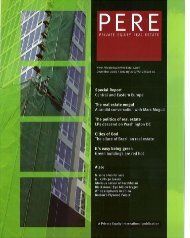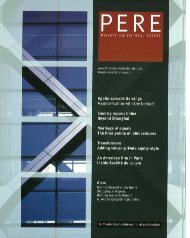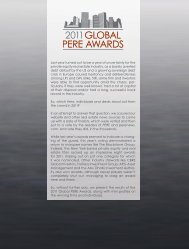2010AWARDS & AnnuAL REVIEW - PERE
2010AWARDS & AnnuAL REVIEW - PERE
2010AWARDS & AnnuAL REVIEW - PERE
You also want an ePaper? Increase the reach of your titles
YUMPU automatically turns print PDFs into web optimized ePapers that Google loves.
Trap for some, honey for others<br />
despite stories of private equity firms running into<br />
trouble with their Macau investments, the gaming<br />
state’s demographics were impossible to ignore<br />
Is Macau a honey trap for international investors? The mess<br />
that is Macau Studio City was the latest in a line of stories<br />
emanating from the former Portuguese colony that would<br />
suggest so.<br />
A three-year dispute over financing between the multiple<br />
owners of the casino development – including Oaktree Capital<br />
Management and Silver Point Capital – could end with it being<br />
handed back to Macau authorities. If so, the two investors<br />
would be hit with a loss of $250 million.<br />
Non-gaming schemes backed by private equity also hit difficulties,<br />
particularly those without secure planning consents<br />
at the time of the conviction of Ao Man-long, Macao’s former<br />
ministry of transport and public works responsible for planning<br />
decisions. After he was jailed for 27 years in January 2008<br />
amid a state-wide corruption and bribery scandal, numerous<br />
schemes were hit with more onerous zoning constraints.<br />
While there are anecdotes aplenty of real estate investors<br />
running aground, it is impossible not to be attracted to Macao’s<br />
honey despite its numerous traps. Macau generated GDP<br />
growth of 8.2 percent and record gaming revenues of $15 billion<br />
in 2009. In comparison, Las Vegas generated $10.4 billion.<br />
Considering that gambling is the Chinese national pastime and<br />
there is just one place – Macau – where it can be done legally, it<br />
is illogical not to allocate something.<br />
More importantly, firms have been able to make full-circle<br />
investments in Macau and handsome profits. Take Manhattan,<br />
the joint venture residential scheme between Citi Property Investors<br />
and local developer-cum-investor Macauland. Within<br />
a couple of years, the partners had sold and their exit reflected<br />
an IRR of more than 30 percent and a 1.8x equity multiple.<br />
Probing China’s bubble<br />
Private equity real estate firms considered their<br />
options as China’s real estate market continued<br />
to heat up<br />
When chairman and managing director of JPMorgan Chase’s<br />
China equities division, Jing Ulrich, painted a picture of China’s<br />
overheating real estate market for the benefit of delegates<br />
at the <strong>PERE</strong> Forum: Asia in February of last year, she could not<br />
have guessed that the temperature would continue rising.<br />
Ulrich, who was featured in Forbes’ 100 most powerful<br />
women table two years ago, told the audience how China’s<br />
GDP growth had reached 10.7 percent in the final quarter of<br />
2008, predominantly on the back of a rising domestic real estate<br />
market.<br />
Ulrich explained how loose government policy and bank<br />
lending had led to record growth in real estate lending of 33<br />
percent year-on-year (compared with a five-year average of between<br />
14 percent and 16 percent), spawning worrying levels of<br />
real estate speculation. But she suggested the government had<br />
taken adequate measures to stem the inflation of an uncontrollable<br />
bubble, ensuring Chinese real estate would receive a soft<br />
landing should the bubble burst.<br />
Forecasting that property sales and acquisitions would fall<br />
by 15 percent in 2010, Ulrich predicted 2010 would yield little<br />
further government intervention, but the opposite happened.<br />
With GDP growth at 11.9 percent year-on-year, according to<br />
China’s National Bureau of Statistics, Beijing introduced extra<br />
taxes on areas including individual’s profits from property<br />
sales. And it appears the government isn’t letting up in 2011,<br />
having already announced property tax trials on some homes<br />
in high-value areas of Shanghai in January.<br />
new GPs wanted<br />
lPs on stage at the Pere Forum: Asia expressed<br />
support for first time funds. that was good news<br />
as there were many new funds in the works<br />
Any delegate at the <strong>PERE</strong> Forum: Asia thinking of setting up<br />
his or her own real estate fund management platform would<br />
have been heartened by what was said on stage during the final<br />
panel conversation. Five LPs, either already invested in Asia<br />
real estate funds or seriously thinking about committing to<br />
Asia real estate funds, unanimously agreed they were keen to<br />
support qualified first-time fund managers.<br />
One LP – Nirav Kachalia, managing director of investments<br />
at US- and Asia-focused investment advisor Morgan Creek –<br />
was so keen to stress his support for newcomers he told delegates<br />
his firm had backed 70 first-time funds. Furthermore,<br />
60 percent of the managers backed by his organisation were<br />
through funds one, two or three.<br />
Doug Coulter, vice president and head of private equity for<br />
Asia Pacific at private equity fund of funds business LGT Partners,<br />
went one further when he said the firm’s best performances<br />
on balance had come from backing first-time funds. He told<br />
delegates the firm, which had only made minor investments in<br />
real estate vehicles in Europe before now, was seriously considering<br />
a more extensive Asia investment programme.<br />
The other three participants – including the panel chair, another<br />
LP – made similarly encouraging remarks. This was good<br />
news for anyone thinking of spinning out to start a new firm.<br />
In the three months prior to the conference, <strong>PERE</strong> broke multiple<br />
news stories of individuals flying their own fund management<br />
flags for the first time.<br />
One often hears that many investors avoid “first-time funds”.<br />
However, in a less mature market like Asia, there simply aren’t<br />
that many Fund IIIs out there. In addition, in today’s turbulent<br />
real estate market, investors are keen to back talented groups<br />
that are not saddled with disastrous portfolios and who will<br />
pursue fresh strategies informed by the painful mistakes of the<br />
last cycle. Indeed, it’s time to back the next generation.<br />
2010 AwArds & AnnuAl review | <strong>PERE</strong> 55







